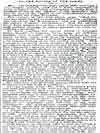John Rae to the Editor (1854)
TO THE EDITOR OF THE TIMES
Sir, - On looking over your paper this morning I was deeply pained, and not a little surprised, at some remarks in a letter purporting to come from a brother of one of the officers of Her Majesty’s ship Terror, one of the vessels of the unfortunate expedition under Sir John Franklin.
The writer, in the first place, says, “that Dr. Rae has been deeply reprehensible for not verifying the report of the Esquimaux and for publishing his report without verification ; that he should have kept silence altogether, and not have excited such painful feelings in many persons on such insufficient grounds.”
To have verified the report which I brought home would, I believe, have been no difficult matter, but it could not possibly be done by my party in any other way than by passing another winter at Repulse Bay, and making another journey over the ice and snow in the spring of 1855. This I could have easily done, without exposure to more privations than persons accustomed to the Hudson’s Bay Company’s service are in the habit of enduring; but I had a deeper motive in returning to England with the information I had obtained than the mere selfish feeling of regard from my own comfort, which is a point I have never much studied. My reason for returning from Repulse Bay without having effected the survey I had contemplated was to prevent the risk of more valuable lives being sacrificed in a useless search in portions of the Arctic seas hundreds of miles distant from the sad scene where the lives of so many of the long-lost party terminated ; and I am happy to say that my conduct has been approved by all those whose opinion I value, and with whom I have conversed on the subject.
[It] is stated by your correspondent, “that where Esquimaux can live, where Dr. Rae’s party could find abundant means, what should prevent Sir John Franklin and his party from subsisting too?”
No man but one perfectly unacquainted with the subject could ask such a question.
At the season when Sir John Franklin’s party was seen travelling over the ice the seal-holes are covered by snow, and can only be discovered by the acute sense of smell of the native dogs ; and, after the seal-hole is discovered, much patience, experience, and care are requisite to kill the seal. As soon as the snow thaws (say in June) the seals show themselves on the ice, but they are then so difficult to approach that not one of my men (Ouligbuck, the interpreter, excepted), although they often made the attempt, could approach near enough to shoot any of these animals.
I wintered at a part of the Arctic coast remarkable by its geographical formation for the abundance of deer during the autumn migrations, but only then ; and it was at that time that we laid up our winter stock of food, but it was hard work even for us (all practised sport-men, picked men, and in full strength and training) to collect a sufficiency.
That portion of country near to and on which a portion of Sir John Franklin’s party was seen is in the spring notoriously the most barren of animal life of any of the Arctic shores.
[…]
To prove this scarcity of game, I may add that during my spring journey of 56 days’ duration one deer only and a few partridges were shot by us.
It is asked by your correspondent why “the unfortunate men should have encumbered themselves with silver forks and spoons and silver plates, &c.”
The total weight of the silver forks and spoons could not be more than 4lb. or 5 lb. at the utmost, and would not appear much when divided among 40 persons ; and any officer who has ever had the misfortune to abandon his ship or boat anywhere, but more particularly in the Arctic sea, knows well how apt men are to encumber themselves with articles far more useless and bulky than a few forks and spoons.
I suppose by “silver plates” your correspondent alludes to the silver plate with Sir John Franklin’s name engraved thereon, and which may possibly weigh half an ounce – no great addition to a man’s load.
Again, your correspondent says “that the ships have been abandoned and pillaged by the Esquimaux.” In this opinion I perfectly agree so far as regards the abandonment of the ships, but not that those ships were pillaged by the natives. Had this been the case wood would have been abundant among those poor people. It was not so, and they were reduced to the necessity of making their sledges of musk-ox skins folded up and frozen together, an alternative to which the want of wood alone could have reduced them. Another proof that the natives had very little wood among them may be adduced.
Before leaving Repulse Bay I collected together some of the most respectable of the old Esquimaux and distributed among them all the wood we could spare, amounting to two or three oars and some broken poles. When these things were delivered to them I bade the Esquimaux interpreter, who speaks both his own and the English language fluently, to ask whether they or their acquaintances near Pelly Bay had now most wood. They all immediately shouted out, holding up their hands, that they themselves had most. I scarcely add that, had the ships been found by the Esquimaux, a stock of wood sufficient for many years for all the natives within an extent of several hundred miles would have been obtained.
It may be well here to state, for the information of your correspondent, and others, that the authorities of the Hon. Hudson’s Bay Company have, in the most kind manner, permitted me to devote my whole time, as long as requisite, to satisfy the questions, as far as in my power, and to reply to communications from the relatives and friends of the long missing party, instead of to complete my chart and write up the report of my expedition for their information.
It may interest your readers to learn that two overland expeditions have been decided upon – the one in boats, to go down the Mackenzie River in search of Captain Collinson, about the safety of whom there is now some anxiety ; the other in canoes, down Back’s Fish River, to make further inquiry into the fate of Sir J. Franklin’s people, and to endeavour to obtain some more relics ; and, should any of the remains of the dead be found, to place them decently under ground.
About noon on Friday it was arranged by the Lords Commissioners of the Admiralty and Captain Shepherd, Deputy-Governor of the Hudson’s Bay Company, that these expeditions should be left wholly in the hands of the Hudson’s Bay Company, and the same evening the Deputy-Governor had posted letters to Sir George Simpson, territorial Governor, containing full details as to the objects and mode of carrying into effect these expeditions.
I trust that any of the relatives of the lost navigators who may in future wish to make severe remarks on the mode in which I have acted, in the very perplexing position in which I was placed, will first do me the favour of communicating with me, and, if I cannot satisfy their doubts, it will then be quite time enough to make their opinions public – such would be the more fair and satisfactory course.
In conclusion, let me observe that I am at a loss to discover what course of proceeding your correspondent would have desired me to pursue. I have assigned the reason for my return ; if he can offer an equally good one or a better why I should have stayed out another year, I should be most happy to learn it, either by letter to myself or through the medium of your columns.
I have the honour to be, Sir,
Your most obedient servant,
JOHN RAE
Tavistock Hotel, Covent-garden, Oct. 30.



